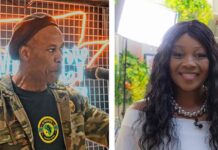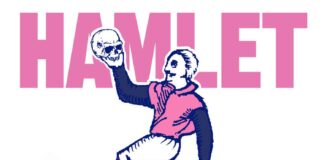Dave Randall talks to Celeste Bell, daughter of Poly Styrene. She has just finished a film about the uniquely talented performer and artist who grew up in Brixton
Poly Styrene: I Am A Cliché will be released via Modern Films from Friday 5 March. By purchasing a ‘virtual ticket’, viewers will be able to support a participating local independent cinema – the revenue will be shared with the venue. The world premiere comes beforehand at the Glasgow Film Festival later this month
Dave Randall: Celeste Bell, thank you very much for agreeing to do this interview with the Brixton Blog.
You are, of course, here to speak about a film that you’ve just finished. A film which, in large part, is about your mum, Marianne or Mari Elliott, who will be better known to our readers and viewers as the punk icon Poly Styrene.
The film is called Poly Styrene: I am a Cliché and I think that people can see it online towards the end of this month as part of the Glasgow Film Festival.
Now the film comes fairly hot on the heels of this fantastic book, which you helped to produce – Dayglo – which, indeed, you launched, I’m sure, among other places in Brixton at the Brixton library.
Celeste, you must be very proud to have created these wonderful legacy pieces for your mum.
Celeste Bell: Yes, definitely very proud. And it’s been a real pleasure to do this very rewarding experience.
DR: Of course, your mum grew up here in Brixton, I think initially on the Cowley estate and then later on she moved to Evandale Road just off Loughborough Road, which is right near where I’m speaking to you from now. An unusually snowy Brixton, in fact.
What sort of a childhood to do you think that your mum had growing up in Brixton? It would have been, I suppose, in the 1960s and 70s, wouldn’t that?
CB: Yeah, so growing up in Brixton. It was a very different Brixton to Brixton today. You know, this was just sort of post-war. She was born in the fifties in Bromley and the family moved to Brixton when she was very small because my mum was mixed race and Bromley was very white and middle class at the time.
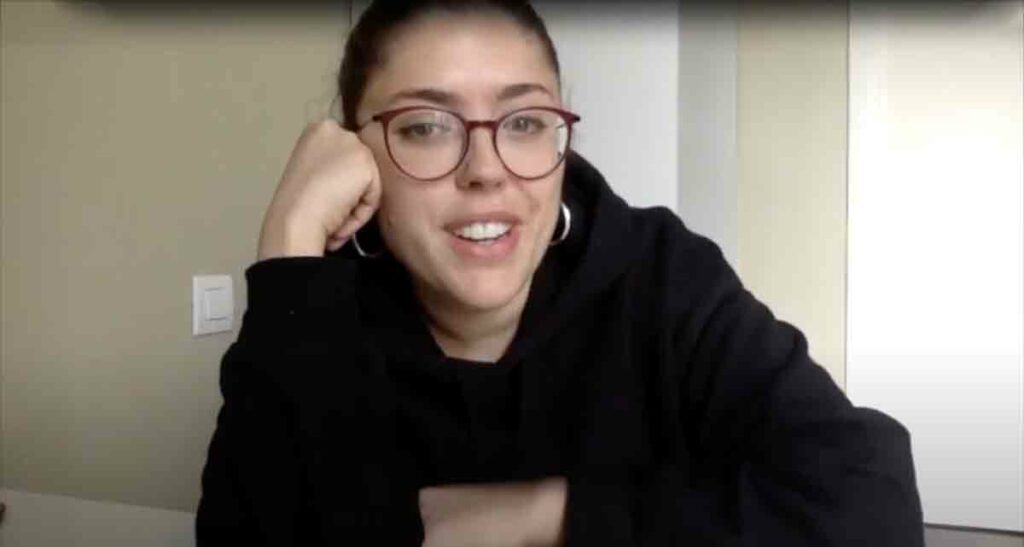
And my grandmother, who was white English, she faced some prejudice there. Nothing overt, but, you know, like dirty looks and kind of shocked faces, so she felt that Brixton would be a better environment for her kids because it was just starting in the late 50s to become more multicultural and there was a sizeable Afro-Caribbean community in the area.
So I think that’s what attracted my grandmother to Brixton. But it wasn’t as multicultural, obviously, as it is now.
It was still very, I would say, it was still majority white working class when my mother was growing up. So there was still, actually, a lot of racism in Brixton.
DR: Your mum, of course, was half Somalian.
CB: Yeah.
DR: In the film, you actually talk about the fact that you feel that she experienced a particular type of racism because she was mixed race. That was the case in Brixton as well, was it?
CB: Yeah, I mean, it was everywhere, you know. Brixton had more mixed-race people, and there were more Black people. But there was still the National Front. There were a lot of skinheads. Skinheads weren’t necessarily racist at that early, very early 60s stage. My mother had friends who were skinheads, but they were still very violent and it was a very violent time.
DR: So she had to be a tough cookie. And, indeed, you give the impression that she was a tough kid.
CB: Yes, she was a tough kid. But she was forced to be a tough kid because it was a tough environment. She went to a very rough school called Stockwell Manor; later Stockwell Park.
And now it’s got a completely different name. I’m not sure what it’s called now, but it’s still there [Stockwell Park school closed in 2011 and the site is now used by Platanos College, an academy school – Editor]. And that was a big, huge, comprehensive school. I think a lot of money was put into building it. So when she went there, it was all shiny and she wanted to go for the facilities – they had a pool, but it was very rough. There were lots of fights. In fact, police would be patrolling the corridors because of knife crime. People talk about knife crime now like something relatively new. But it was actually a major issue when my mum was growing up as well.
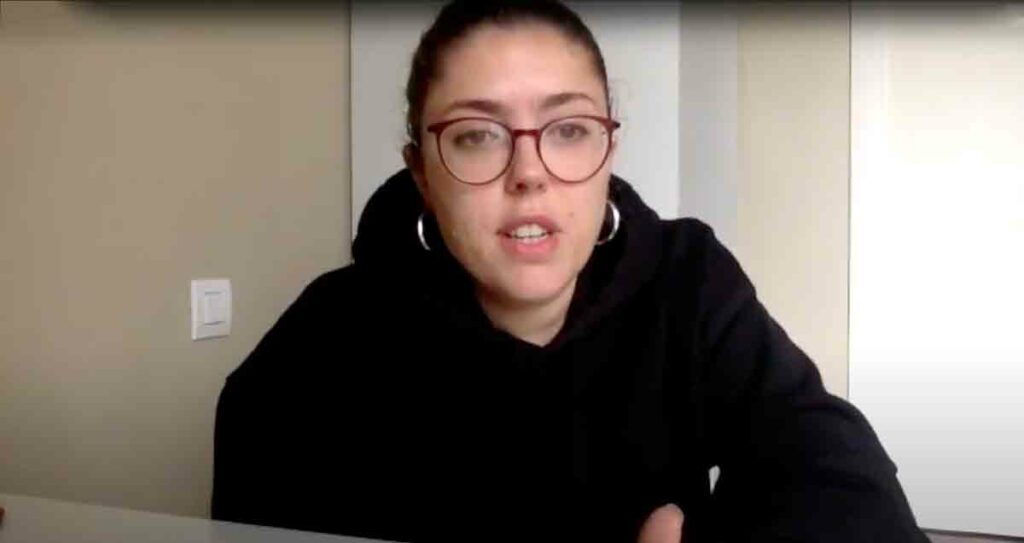
DR: Yeah. And at what point did she move from Cowley estate to Evandale Road? I remember from Dayglo that that was a better situation for the family.
CB: Yes, so my grandmother came from quite a middle class sort of suburban background in Bromley and hated living on the council estate. She never felt happy. It was very cramped. The conditions were very … they had coal fires. It was cold. It was damp. It was it was tough. So when my grandmother got a council house on Evandale road – it was a big early Victorian terraced house – she was over the moon. I think the kids were less fussed because they actually had quite a nice time on the estate because they had a lot of friends and they could play in the yard. And, you know, it was a bit more a bit more fun, I think, for the kids. But for my grandmother, it was tough living there, and she was really happy that they got a house with a garden – my grandmother was a huge gardener. She really loved that. But my mum must have been about 12 or 13 when they moved to the house and she left home at 15. So she didn’t actually get to spend too much time there.
DR: So, it was, in some senses, a tough childhood, but also quite a happy childhood a lot of the time.
CB: Yeah.
DR: She leaves home around the age of 15. I’m guessing it wasn’t too long after that that the chapter in her life that people know about begins. At some point she sees the Sex Pistols playing on Hastings pier and is inspired by that. And by 1976, I think it is, she has, of course, put together her band, X-Ray Spex. They go on to record Germfree Adolescents with a number of well known songs, perhaps the best known Oh, Bondage Up Yours. An absolutely influential song to this day.
Now, when I watch the film, what really strikes me from that period, watching the footage, was, first of all, how brilliant your mum and her band were, but secondly, how incredibly sort of condescending a lot of the journalists are who speak with her. I mean, I’m guessing that although the punk scene was her scene of choice, this was still quite a hostile scene for a woman and possibly a woman of colour. Do you get that sense, too? It slightly makes my blood boil to see the almost the bullying tactics that these journalists were using at the time when they spoke with your mum.
CB: Yeah, I think it was it was a hostile, relatively hostile, environment for anyone. I think it was it was the late 70s – everyone was trying to be cool, you know, the journalists – and it was all about being cool, being nonchalant, not giving a fuck.
My mum was actually a very sensitive person. So it was quite a tough environment. It wasn’t just journalists. It was even the audiences. These gigs – it was very boisterous, very rough – you know, the spitting on the stage. You see in the film there’s a scene where she’s coming offstage and people like rush onto the stage and they’d be grabbing her and trying to kiss her. Basically, I think that people weren’t as respectful of boundaries at that time – there were no boundaries initially.
DR: Right.
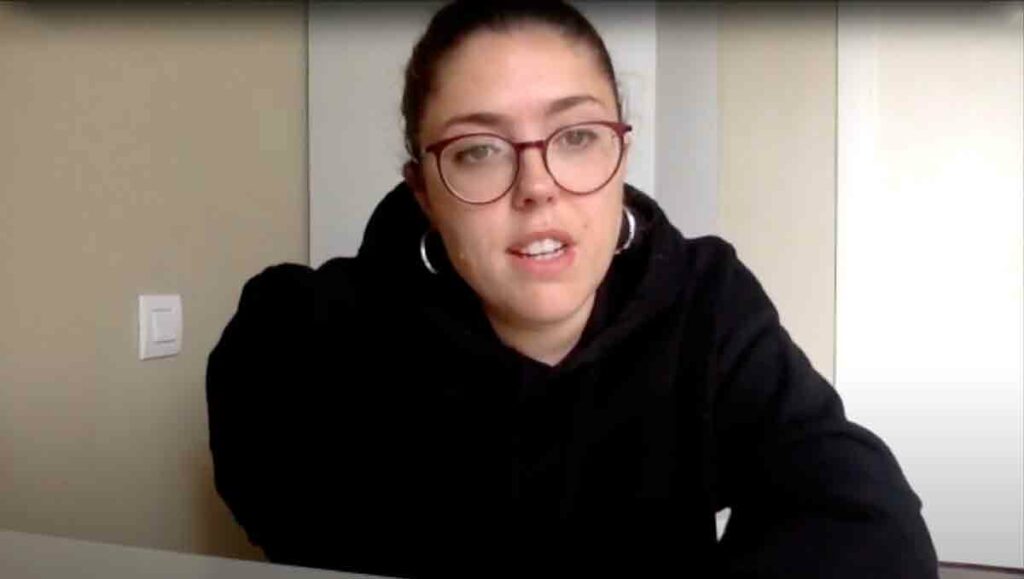
CB: So it was one of the toughest eras to be a musician if you were sensitive, kind of vulnerable soul, as my mum was. Luckily she had that experience of growing up where she had to be tough and she was a fighter. So that kind of got her through it initially, but it wasn’t enough for her to sustain a lifestyle like that for too long.
DR: No. I think she’s very gracious in the way that she deals with these individuals. But you can also see, yes, that she’s very sensitive, and also that she’s highly intelligent. I mean, she’s way ahead of these people and their condescending questions. And, of course, her creativity, her artistry went way beyond X-Ray Spex and punk music. She was a fantastic visual artist. And I think that’s one of the things that the people need to know about and celebrate more. But she’s a sensitive individual, highly intelligent, and around this time, people start to get a sense that she might have some mental health problems. I think she was misdiagnosed around that time. Is that right?
CB: Yes, she was misdiagnosed with schizophrenia in the end, around the time that she was touring with X-Ray Spex because she suffered a series of breakdowns and she definitely showed some of the classic, let’s say, symptoms of schizophrenia. So she was hearing voices and she had hallucinations. So she was misdiagnosed. Much later, must have been about 10 years later, she finally got the correct diagnosis of bipolar disorder. But her type of bipolar disorder was a very severe form of bipolar, where there was a kind of crossover with schizophrenia. So, in some ways, it was understandable why she was misdiagnosed. There wasn’t maybe as much knowledge at the time. Mental health wasn’t what it is now. Obviously, there’s still a lot of improvements that need to be made, but I think that it was still quite a trial-and-error type period– the treatments as well. She had electric shock therapy.
DR: Wow.
CB: So it was very different. And then the other factor, of course, is that people of colour, Black British mainly, have been disproportionately misdiagnosed as suffering from schizophrenia in this country – historically and to this day as well. So that’s another another factor to bear in mind.
DR: Yeah. So she found herself, I would imagine, in quite a confused and difficult situation in a whole number of ways at the end of the 70s. Then, I think, in 1981 she meets your dad and you come along quite soon after that, and your mum, as well as meeting your dad and having you, she also begins a spiritual journey into the Hare Krishna faith. I’m wondering are your earliest memories, Celeste, from the Hare Krishna Temple in Hertfordshire, the one bought for the movement by George Harrison, which I believe you and your mum moved to?
CB: Yes. I was born when my mum, just before my mum joined the movement – she joined when I was about six months old. So, yeah, my earliest memories are not the manor [Bhaktivedanta Manor, a temple in Hertfordshire – Editor] because I my mum moved to the manor when I was about three or four. Before that, we were living near the Soho Street Temple in London. We lived in Baker Street and we would go to the temple every day. So that was my that was the earliest Hare Krishna memory – of being in the London temple.

And I was actually going to a regular primary school in the West End. But then we moved to the manor when I was about four and and I went to school in the in the manor– it was a full immersion.
DR: Yeah, I’m guessing that was tough thing if you were aware of another life before that in central London, a more ordinary type of education. What was life like in the temple in Hertfordshire?
CB: To be honest, it was much more tough leaving the manor and going back to school in London than the other way, because life in the manor was very idyllic … maybe it wouldn’t have been for everyone if you’re an adult. But if you were a child, I don’t think you can have a happier childhood, really, than being in that environment. We were living in a in a country estate, it was surrounded by land – woodland, park, gardens – and we had total freedom to play and explore and be outside all the time. It was a community. So you felt very safe there and you had freedom. So safety and freedom, I think for children, you don’t get much better than that. Certainly being a child in inner city London is much, much, much more difficult than in that kind of utopian environment.
DR: And yet it was your decision, I think, to move back to Brixton in with your grandmother. Your mum, who at this time was called Maharani, she’d been given that name by Hare Krishna movement.
Your decision to move out – was that because you felt that you weren’t persuaded by the spiritual teachings that you had the distance growing between you and the religion, or was it that you and your mum were getting on so well? Why that decision to move away from the temple and back to Brixton?
CB: I was only eight years old, so, you know, it was my decision, but it wasn’t at the same time. The main issue is my mother’s mental health. She had actually taken me out of the Hare Krishna sort of ashram where I was previously. We weren’t in the temple at that point. We were just living near the temple in a house and her mental health was very bad. So that’s why I had to leave and that’s why I decided to leave at the same time. But it wasn’t really my choice. I was going to be removed from her care ,no matter what. But I just made the initial decision, but it had to happen because she wasn’t able to look after me. Her mental health was very bad. In terms of the movement and the religion, it was all I knew, so I didn’t have any other kind of perspective on whether it was what I wanted … whether I believe it or not. As I said, it was it was much harder leaving that environment and going into the normal world, the real world, actually. That was a real adjustment.
DR: Celeste … because not only leaving the environment that you’ve become familiar with, but leaving your mum there knowing that she wasn’t completely well. How did you cope? What was that period of your life like?
CB: It was it was tough. There was a lot of culture shock know. I went from a school where I’d never really heard a swear word, to inner city London, where the first day of school …
So I moved to Brixton to live with my grandmother

DR: I’m sorry to interrupt you. So she was in Evandale Road still.
CB: Yeah. So I made into Evandale Road and I went to the local Church of England primary school, St John’s, and it’s actually kind of surrounded by the Angell Town estate. My first day of school, I think, some kid wanted to fight with me. To be honest, I was quite amused, if anything, by the whole experience, because it was so bizarre and it was it was so different.
But I was a very resilient kid, so I was able to adapt quickly. And I think I was helped because my grandmother, who I went to live with, was a Second World War generation, very stoic, stiff upper lip, kind of very English grandmother who didn’t tolerate any self-pity. So I had I just had to get on with it, and I did.
DR: Do you think that was helpful or a hindrance? You think that was helpful?
CB: I think for me and my character, it was helpful. It may not have been helpful for everyone. And now it wouldn’t probably be seen in the current times as the best way of dealing with things. But, for me, it was it was the right approach, definitely.
DR: Now, the filming inevitably condenses a lot of years, but that was working for you – the care of your grandmother and adjusting to life here in Brixton. Around this time, or perhaps I suppose a little bit later, things appear to start improving for your mum. When did she eventually move away from the temple?
I mean, you know, by the time we get into the early noughties, she’s making music again, talking about the possibility. In fact, I think there’s a reunion of X-Ray Spex in the late 90s and then a more famous couple of occasions later on. Tell me what’s happening with her during this period.
CB: So when I went to my grandmother, shortly after my mother moved back to South London, mainly so she could be near me. So I could spend weekends with her. And that’s kind of what happened. I spent weekdays with my grandmother, and I would spend weekends with my mum until I was about 15. And then I went to live with my mum again full time. So that was actually quite good for her in the sense that she was she was forced to look after her mental health. She became an outpatient, sometimes an inpatient at the Maudsley when she really got the correct diagnosis and she was given medicine that worked. So that was quite good for her. And then, being in London, she was able to reconnect with music and X-Ray Spex. And she did. In the early 90s she reformed X-Ray Spex. She did a gig at the Roundhouse, an album, Conscious Consumer. I think it was tough for her, the whole experience of me moving out and living with my grandmother. But it was a catalyst for my mum to stop being an artist or musician again, which was good. She wasn’t happy, obviously, with that transition initially. But then I think it was sort of worked out for the best.

DR: Yeah. And it seems to have worked out for the best, not only in terms of her health, but also your relationship with her, because, of course, you make it clear in the film that that was often quite a troubled relationship and understandably so in lots of ways. But you seem to become closer to her through this period. And there are a couple of muments in the film which are incredibly powerful. One of them is when you join her on stage at the Roundhouse. But I think this is 2008. This is later on. Is that right?
CB: Oh, yeah, did I say she performed the Roundhouse in the nineties? Sorry, that was the Brixton Academy. The Roundhouse was in 2008 and that was the second time she reformed X-Ray Spex for a gig. And yes, that was an incredible moment.
DR: My friends at Love Music, Hate Racism won’t forgive me if I don’t put this on the record. X-Ray Spex opened the most famous Rock Against Racism carnival in 1978 at Victoria Park. But in 2008, she also took to the stage back in Victoria Park for the Love Music Hate Racism carnival. I think that was earlier in the year, perhaps in April. And then, yes, you join her on stage at the Roundhouse. You were concerned for her taking to the stage and revisiting that part of her life. But clearly, this was this felt like a wonderful moment of connection. Tell me how that felt for you.
CB: It was it was amazing for lots of reasons. One was that I had formed my own band that year and the we opened for for my mum’s band, so we opened for X-Ray Spex. So that was my first gig, basically, was at the Rondhouse. So obviously it was had a lot of adrenaline and I was on a real high and then joining my mum for the encore of Oh Bondage was the icing on the cake. It was an amazing evening really. And my mum had a great time in the end. She was quite nervous about it. And the fact that she got up there and she pulled it off, it was it was great to see. But, yeah, it took a lot out of her. Performing life was something that she might have enjoyed in the early, early days. But she didn’t enjoy it too much …
DR: Yeah. But she obviously was enjoying making music sufficiently to agree to make another album, Generation Indigo, did you collaborate with her on that album?
CB: Yes, we worked and I co-wrote a couple of the songs, one of which was Black Christmas. And we recorded that together, with the producer, Youth. He produced that album.

DR:: Black Christmas was the single I seem to remember.
CB: It was one of the singles – Generation Indigo, Virtual Boyfriend and Black Christmas. I recorded that track with my mum at Youth’s studio, which was really fun. He’s a great guy. We also interviewed him for the the film and the book.
So, yeah, lovely experience. My mum loved making music. She loved writing, she loved recording, rehearsing. It was just the experience of performing live I think because she had some traumatic memories from the early years. That was what she struggled with more than anything. But she was always making music. She never stopped making music throughout her life. She must have been 15 when she started writing songs and she continued to the end.
DR: And also always making visual art. Is that true to say? She was writing poetry and writing. She really was an artist in the broadest and best sense.
CB: She was very artistic in terms of visual art. She was always drawing, painting. Collage was what she was most into, especially in the seventies – collage and punk, she loved that.
She also made her own clothes. She was a great seamstress, so she’d make her own clothes from scratch. And writing – she was always writing, whether it was lyrics, whether it was story short stories, poems. So yeah, she was definitely a multi-disciplinary artist and without any formal training, which is amazing. She never went to art school. I remember an article, I think it was in the Guardian, and in the comment section someone was like: they were an art school band or she’d gone to art school as a criticism. I find that hilarious because she left school at 15 without completing her O-levels. She had no qualifications whatsoever, let alone go to art school. She maybe belonged to some after-school clubs and things like that, but that was the extent of of her training. So she was really self-taught.
DR: Yeah. It’s fascinating, isn’t it? There are many honourable exceptions, but I feel at the moment when I look around the artists, pop stars and so on, so many of them are sort of so posh and polished and focused on their career in the very conventional way. They’re actually quite bland – more Poly Styrenes, please.
But let me take you back to that period, then. You’re working on Generation Indigo. Your relationship with your mum appears at least to be in great shape, possibly the best it’s been for a long time. And then you receive the devastating news that your mum has breast cancer. That must have been a a devastating piece of news to receive.
CB: Yes, devastating for my mum, for me, but for the whole the whole family. It was very unexpected and it had already spread to most of her body, so she didn’t live much longer than the diagnosis, which is always really hard to deal with. But, on the other hand, there is a blessing there as well, because it’s not something that she had to struggle with for years and years., My mum was very stoic about death and she had great spiritual strength and a very firm belief in an afterlife. And I think all of those things helped her, really, really helped her. She was very strong, very positive throughout. And so that gives me that gives me strength. And it’s not that I don’t necessarily look back on her diagnosis and even her dying as a traumatic experience. Because of her strength and the way she approached it, it was like a lesson about how to approach dying.

DR: Your mum had very strong religious and spiritual beliefs. Her wish was that you scatter her ashes in a holy place in India. And I think one of the most powerful moments in the film is when you make the trip to India to do exactly that. You describe that action as setting her free. But I’m wondering, Celeste, did it also help to set you free? Does it help you to come to some sort of sense of resolution about your relationship with your mother and that chapter in your life?
CB: Yes, definitely going India was it was her last wish, and it was something that I didn’t do immediately. I waited a few years. I kind of put it off. I had a lot going on. And so it was it was that trip to India with her ashes was really, for me, maybe more significant than her funeral, because it was it was really more personal. It was just like it was me and her on that journey. That was where I could really say goodbye to her and really feel like I had carried out her wishes. So there was a great sense of resolution. And also just being in India. It wasn’t the first time I’d been to India. We went together when I was a teenager for the first time. But my mum had been there seven or eight times in her life. India was so important to my mum, so being there and going to the places that she went to that had so much meaning for her, obviously it was for me a very rich experience. And then obviously we went back to India to film. I feel like India has a special place in my heart as well, because it was so important to my mum and I was also able to make new memories there. So, yeah, that whole experience was amazing.
DR: So your mum has been set free, in a sense, you have too, and you have now created these wonderful legacy pieces for your mum. You’ve already mentioned your music, you’re clearly an extremely talented writer, filmmaker. What’s next for Celeste Bell?
CB: Well, I’m also a teacher, so I will probably continue teaching and I want to continue writing and continue with filmmaking, if I can. And maybe music. Music has been really neglected. I’ve neglected music for a long time now, and it’s something I would like to do to get back into it. But at the moment, I’m I’m working on a project, a book … maybe a book/film project, exploring more my experiences in the Hare Krishna movement and the history of the movement and its significance to cultural history. It’s something I’m really interested in, obviously, because I grew up in it, but also because I’m fascinated with new religious movements and that period of history. I studied English and history at uni. And I think I approached the book and the film in many ways as a historian, even though it was my own family’s story. But that’s kind of how I like to approach these things. So, yeah, I would like to just do a more thorough investigation of the Hare Krishna movement. And that’s the next project.
DR: Fascinating. Well, I shall look forward very much to that. But for now thanks so much for making the time to speak with me. Thanks, Celeste. Well, it’s been an absolute pleasure.
CB: Thank you very much. Take care.



